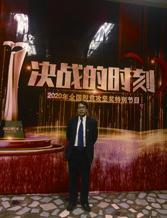National Pioneers
By Lu Yan
Born in the 1980s, Huang Xiaoyong is an entrepreneur who used to run a foreign trade company in Shenzhen, Guangdong Province, with an annual turnover exceeding 10 million yuan ($1.5 million). Had Huang stuck to his original trajectory in life and stayed put in Shenzhen, he would have nothing to do with farming later in life.
However, in 2014, when Huangs home county Shicheng in Jiangxi Province in east China introduced a series of policies to encourage business and attract investment in a bid to facilitate poverty alleviation work, he returned home and devoted himself to developing modern ecological agriculture and teaching his fellow villagers how to make more money.
“As an entrepreneur, I have the responsibility to help the poor families around me rid themselves of poverty as soon as possible,” Huang told China Youth Daily.
Huang received a national award on October 17 in Beijing for his outstanding work in the field of poverty alleviation. The day was also the seventh National Poverty Relief Day and the 28th International Day for the Eradication of Poverty.
The national awards for outstanding work in the field of poverty alleviation, initiated by the State Council Leading Group Office of Poverty Alleviation and Development, are given annually since 2016. Individuals are awarded as role models for shaking off poverty themselves or assisting others to do so. Since 2018, organizations, too, have received accolades for their contributions to poverty alleviation.
The award ceremony received more public attention this year as the deadline for the country to eradicate absolute poverty looms. “The awards encourage people in poverty-stricken areas to eradicate poverty through hard work,”Wang Sangui, a member of the expert advisory committee of the State Council Leading Group Office of Poverty Alleviation and Development, told China Youth Daily.
Common prosperity
While running a startup business elsewhere before, Huang remained concerned about the development of his hometown, especially Aobei Village, where he was born and raised.
There are over 2,000 people in Aobei. The per-capita arable land there is meager. Also, the village is located in a mountainous area, which made it difficult to increase the villagers income and develop the village.

Green poverty alleviation
While Huang has been awarded for leading his fellow townsmen out of poverty, Zhang Qi, head of the China Institute for Poverty Reduction of Beijing Normal University (BNU), received the award for research on poverty alleviation theory, policy and practice.
Since the late 1980s, Zhang has devoted himself to research on rural economy and poverty alleviation policies. “I was born in the countryside, so I know what poverty does to a person. This is why I should do research on poverty alleviation,” Zhang said.
As Chinas poor people mainly live in remote rural areas, Zhang and his team mostly connect with farmers. Every year, the China Institute for Poverty Reduction sends out small teams to the poverty-stricken mountainous and rural areas of Yunnan, Guizhou, Sichuan, Gansu and other provinces to track the progress of poverty alleviation, as well as uncover the difficulties and problems in poverty alleviation.
The institute constructed Chinas first green poverty reduction index and in 2014 for the first time released the China Green Poverty Reduction Index Report, emphasizing the connection between poverty alleviation and green, sustainable development.
Zhang and his team spent three years on the index. “We want to publish reports on a regular basis to prove that green poverty reduction is the most sustainable means of poverty alleviation and strong support for rural revitalization,” Zhang told China Pictorial.
He said that green poverty alleviation, achieved through endeavors such as developing rural tourism and agricultural industry, have yielded remarkable results in recent years.
When he joined BNU in 2003, he was the only professor there to conduct poverty reduction research. Over the years, the research team he led became bigger and bigger, and in 2011, a poverty alleviation research center was founded, which grew into the China Institute for Poverty Reduction in 2017.
Now, the 30-plus experts there have carried out more than 100 research projects on poverty alleviation. Their research has attracted the attention of government departments and social organizations, illuminating policy making.

